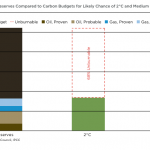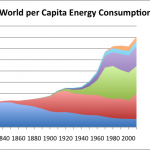natural gas
Obviously, we need to stop the human enhanced extra greenhouse effect. There are a number of ways to approach this. Let me say right away that taking CO2, the main greenhouse gas of concern long term, out of the atmosphere is NOT one of the ways. Here's why: It takes energy to put Carbon into solid or liquid form. You get energy back when you move the Carbon into a gas form (as CO2). That is something of an oversimplification but long term, large scale, it is correct. Since, for the most part, the greenhouse effect is caused by the the generation of energy for use, which causes the movement…
Diablo Canyon Nuclear Power Plant, courtesy PG&E
The announcement that Pacific Gas and Electric (PG&E) will close the Diablo Canyon Nuclear Plant when its current operating licenses expire in 2025 has caused what can only be described as consternation mixed with occasional conniptions among the nuclear industry and some strongly pro-nuclear groups.
That’s understandable. Diablo Canyon is aging, but is not the oldest nuclear plant in the fleet and PG&E could have chosen to push for a renewal of the license to continue operations for many more years. Diablo Canyon’s two reactors…
California’s hottest and driest drought in recorded history has shifted the sources of electricity with adverse economic and environmental consequences. The Pacific Institute has just completed and released a report that evaluates how diminished river flows have resulted in less hydroelectricity, more expensive electricity from the combustion of natural gas, and increased production of greenhouse gas emissions.
The current severe drought has many negative consequences. One of them that receives little attention is how the drought has fundamentally changed the way our electricity is produced.…
As more research is emerging on the potential health effects of fracking, a new study — perhaps the largest to date of its kind — has found that people living near natural gas wells may be at increased risk for adverse health impacts, including skin and respiratory conditions.
Published in the January issue of Environmental Health Perspectives, the study is based on the self-reported health symptoms of nearly 500 people in 180 households in Washington County, Pennsylvania, a community home to some of the most long-standing and intense natural gas drilling activities. Researchers found that…
In a new study just published by the journal Sustainability Science (Springer), analysis from the Pacific Institute (with lead author Dr. Juliet Christian-Smith, now at the Union of Concerned Scientists) shows that many of the fundamental responses of California water users to severe drought actually make the state’s overall water conditions worse – that in the end, many of these actions are “maladaptations.”
Water is a complex resource; and water problems are an equally complex mix of natural resource, technology, social, economic, and political conditions. When water is limited,…
Researchers observed tiny voids forming in silicon used for solar panels; these voids provide physical evidence of the Staebler-Wronski effect, "which reduces the solar cell efficiency by up to 15 percent within the first 1000 hours."
Using an online avatar with a skin color other than your own makes you less racist in real life; playing a hero makes you less cruel, and playing a villain less benevolent.
Old mouse muscles exhibit "elevated levels of activity in a biological cascade called the p38 MAP kinase pathway" which prevents stem cells from dividing and repairing muscle damage. By…
For some time now, proponents of the controversial practice of hydraulic fracturing or “fracking” have claimed there was little or no evidence of real risk to groundwater. But as the classic saying goes: “the absence of evidence is not evidence of absence” of a problem. And the evidence that fracking can contaminate groundwater and drinking water wells is growing stronger with every new study.
As most people now know, fracking is a method for enhancing the production of natural gas (or oil, or geothermal energy wells). Fracking involves injecting fluids -- typically complex mixes of water and…
Over the past half-decade, the US has seen a sharp increase in high-volume hydraulic fracturing -- also called hydrofracking, or simply "fracking" -- to extract natural gas from underground shale formations. States' responses to fracking applications have varied, and in general public health concerns seem to have gotten far too little consideration.
The latest issue of the environmental and occupational health policy journal New Solutions is devoted to the issue of high-volume hydraulic fracturing (HVHF), and PDFs of all the articles are available for free online. It's a great resource for…
Kurt Cobb as usual gets right to the practical heart of the matter in his latest column about why expanding claims about reserves, EVEN IF TRUE don't translate to cheap oil and gas:
Here's the short version of why forecasts of low long-term oil and natural gas prices are almost certainly wrong: It costs more than that to get the stuff out of the ground. Only two things could actually lead to low long-term prices: 1) Somebody could invent and deploy some genuinely brand new technology that makes it really cheap once again to get oil and gas out of the ground or 2) we could have a deep and…
I somehow forgot to draw your attention to Kurt Cobb's wonderful essay on the difference between oil and "liquids" - he does a better job than anyone I know in making clear what most Americans simply don't know about our energy - all liquid fuels are not equivalent. We have been told by implication that they are, and most people are not technically literate enough about oil and energy issues to understand the difference, so it looks like there's plenty of oil - but of course, this isn't oil at all. We could just as easily call it "oil."
But first, an important…
The always-thoughtful Kurt Cobb has a great piece on the intersection between the hydrofracking boom and the mortgage mess:
One fact ought to tell you all you need to know about the risks faced by homeowners signing leases for natural gas drilling on their property: Wells Fargo & Company, both the largest home mortgage lender in the United States and a major lender to the country's second largest producer of natural gas, Chesapeake Energy Corp., refuses to make home loans for properties encumbered with natural gas drilling leases.
This salient fact comes from an article (PDF) written for…
The always-thoughtful Gail Tverberg has a great post that simply shows in visual terms the history of world energy consumption - well worth a look. I've reproduced one of her graphs here, but please read the whole thing.
One graph not in her post (not suggesting it should be, but I like the contrast) is world discovery of oil over about the same period - anyone who implicitly believes we are discovering vast reserves should contrast the two:
(Source, Colin Campbell)
Gail goes on to write about how an economist might be misled by past trends to disregard "facts in the ground" - lack of…
Kurt Cobb has a great article at Resource Insights about why I think the best case against fraccing in my area isn't the water, it is the boom and bust cycle - with a predominance of bust. The last thing rural PA or upstate NY need is another short term boom and bust cycle that leaves them with a lot of played out gas heads and environmental consequences. Or worse, just a plain old bust.
But, in its early release of the Annual Energy Outlook for 2012, the U.S. Energy Information Administration (EIA) cut its estimate of technically recoverable resources of U.S. shale gas from 827 tcf to 482…
A few readers have asked me to comment on Goldman Sachs' prediction that the US will be the world's largest Oil producer in 2017. I am delighted to do so. Several possible comments come to mind.
1. Apparently Crystal Meth has become the trendy drug at Goldman.
2. How did the Yes Men get this published under Goldman's Name?
3. Goldman is apparently even less optimistic about Saudi oil production than I am. They think the depletion curve is going to be a straight line downwards.
4. Oh, wait, they are talking about "oil" not oil! That "oil" stuff is almost infinite - you can magically turn…
Apparently Talisman Energy is taking the case for fraccing to kids in an adorable coloring book. As World Oil News reports:
Following Talisman Terry, children are simplistically introduced to the complex issues of unconventional drilling, pipeline
construction and land reclamation. Presented in before, during and after drilling images, the gas drilling process is introduced as
a gentle engagement with a natural environment. Post-drilling, a fountain-like rainbow appears in the distance and an eagle
soars over an innocuous-looking wellhead.
Of course it does! And the well goes on producing…
While much of the Earth Week news coverage has dwelt on the lasting effects of the BP/Deepwater Horizon disaster, two other events have highlighted a separate but related issue: water supply.
Drought conditions in the Plains and Southwest have damaged winter wheat crops and fueled the spread of wildfires in Texas. Two volunteer firefighters, Elias Jaquez and Eric Finley, have died in Texas; 1,800 firefighters from more than 30 states have been fighting the blazes. As global climate disruption continues, we should expect to see the frequency and severity of extreme weather events like floods…
Proponents of shale gas extraction are not particularly pleased with the attention drawn this week to a new study in Climatic Change that found widespread development of Marcellus natural gas may actually accelerate climate change rather than slow it down. Unfortunately for them, their primary argument rests on a lack of hard data on 1) the actual greenhouse-warming potential of methane; and 2) how much methane finds its way into the atmosphere during drilling and transmission of natural gas. You can find a good summary of the defense's case at something called the Marcellus Shale Coalition.…
It was in Bill McKibben's first, and arguably best, book, The End of Nature, that I first came across the challenge posed by fugitive emissions. Back then -- just 20-some years ago -- natural gas was touted as a cleaner alternative to coal and oil because the combustion of its primary constituent, methane, results in markedly fewer CO2 emissions than other fossil fuels.
That argument is being made even more forcefully now. Everyone and his or her dog is touting the advantage of converting coal mines and car engines to natural gas as a way to mitigate global warming, as well as reduce oil…
Once upon a time, I advised people looking for a peaceful and happy future to choose land under which there were no energy resources. I should have taken my own advice - I'm on the fringe of the Marcellus Shale and the discussion and debate is becoming heated here. Like everyone, I don't particularly want a natural gas flare and dig across the road from me, but that alone wouldn't be enough to make me object - they have to drill somewhere, and Americans use a lot of energy. NIMBYism itself isn't sufficient. What's much more important is that I'm not convinced that the results will be…


